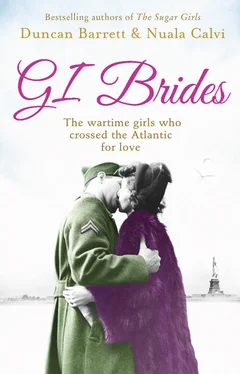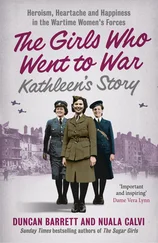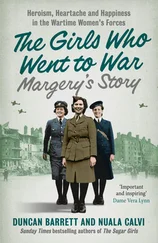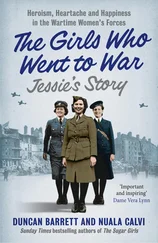The recruits made slow progress, but finally arrived at the barracks and marched into a parade ground. They were led inside a large building and told to line up with their hands on their hips, while a doctor went down the line giving each of them an injection in both arms. Next, they were taken for a hair inspection, to ensure they were free of head lice and that their hair was the regulation two inches off the collar.
Rae hadn’t been bothered by the injections, but she was bothered now. Even when rolled up, there was no way her hair was going to be two inches above her collar.
‘You’ll need to have that chopped off first thing in the morning,’ the sergeant told her.
‘You’re not cutting my hair!’ she retorted. She viewed her long, dark locks as a source of pride.
‘Aye, we are,’ the woman replied. ‘Report back here at 6 a.m.’
Before Rae had a chance to reply, the women were marched to the mess for dinner. Having lived on meagre rations, she was looking forward to a good feed, but even so she couldn’t help finding the fatty mutton that was served up almost inedible. The recruits were expected to eat every last morsel, however, and a scary-looking woman stood on guard duty by the bin, just in case any of them thought of discreetly disposing of it.
Next they were led to the corrugated-iron Nissen huts where they were to sleep, eleven to a hut. Each girl had a little wooden bed frame on which there were three individual squares of mattress, one next to the other. The girls soon found that these thin squares had an annoying tendency to move if they turned over in the night, throwing out the arrangement and giving them sore hips. Even more troubling was the cold – it was February, and in Scotland that meant sub-zero temperatures in the metal hut.
The next morning, the girls were woken at 5 a.m. as the sergeant flung open the door, letting in the bracing Scottish air, and told them to be ready in ten minutes to be issued with their uniforms. Rae remembered she was expected to report for her haircut, and felt as angry as she had the night before. However much she wanted to fight the Germans, she wasn’t going to put up with this. She opened her suitcase and began to pack.
When the other girls were gone, the sergeant came looking for her. ‘What do you think you’re doing?’ she demanded.
‘I’m leaving.’
‘I’ve got news for you, lassie,’ her superior replied. ‘You’ve accepted the King’s shilling, so you’re not going anywhere.’
Rae realised there was nothing she could do. Gritting her teeth, she put the suitcase away and followed the sergeant into one of the brick huts. There, she sat in angry silence as her hair was lopped off and fell to the floor.
Next, the recruits were given their uniforms: a tunic jacket, two skirts, three shirts and a tie, along with a pair of clumpy lace-up shoes and several enormous pairs of bloomers, which were known unofficially as ‘passion killers’.
Once the girls were kitted out, they were led into the parade ground for their first drill practice. This time, no giggling or stumbling about was tolerated, as they circuited the ground over and over again, bellowed at by the sergeant, until their feet fell in perfect rhythm.
After a good half-hour, the girls felt ready for a break, but instead they had to set off into the Scottish countryside to wear in their new shoes with a five-mile march. Rae could feel blisters forming, but there was no let-up as the sergeant shouted, ‘Left! Right! Left! Right!’
By the time they returned to the barracks, the young women were exhausted and miserable, and many of them were close to tears. They now greeted the sight of the spartan Nissen huts with relief, and once inside, gingerly peeled the socks off their blistered feet to bathe them. But before long, they could hear the sergeant’s shrill voice again. ‘Everybody out!’ she shouted. ‘Report to parade ground for drill practice!’
It was a routine that grew crushingly familiar as the days and weeks at the barracks wore on, and Rae, like her fellow recruits, learned that her life was no longer her own, but the Army’s. They were told when to march, when to salute, when to eat and sleep and shower. They were forced to run through the Scottish hills in the driving rain, to negotiate a punishing and muddy assault course, to iron their shirts and polish their buttons.
Rae grew more interested, however, once their combat training began. The girls mastered the basics of unarmed combat, learning how to break a hold and throw an enemy onto the floor. They learned how to shoot a rifle, and how to thrust and lunge at the enemy with a bayonet. They practised getting wounded comrades onto stretchers, and mastered first aid. These unladylike tasks prompted much giggling from some of the girls, but Rae was pleased that she was finally learning to become a fighter. ‘Good, Brewer,’ the sergeant shouted, seeing her enthusiastic attempts to spear an imaginary German.
After a few weeks of training, Rae realised she was beginning to enjoy herself, despite the rigorous discipline. The fresh air and physical exertion suited her, and she had even come to take pride in making her uniform look perfect for the daily inspection, keeping her shirts and tunic pressed by laying them under her mattress every night, and polishing her buttons and shoes until they gleamed.
One day, on the assault course, she was racing as fast as she could when she came up to a rope hung over a ditch. Without slowing down to judge the distance she leaped for it and missed, falling onto the ground below. Her whole weight came down on her left ankle, and she cried out in pain as she felt the joint twist.
Rae was helped to the barracks nurse, who iced the ankle and wrapped it in a tight bandage. ‘Keep it elevated,’ the woman told her. ‘You’ll have to rest up for a couple of weeks.’
While some might have been glad of the rest, Rae was frustrated at not being able to join the others. Once her injury was healed, however, there was even worse news.
‘You’ll have to join the next intake,’ her sergeant told her. ‘You can resume your training – from the beginning.’
Rae watched helplessly as the rest of the girls left Glencorse Barracks without her. She joined the new group of fresh-faced recruits and started the endless process of drill practice all over again.
After completing their training in Scotland, the girls were posted around the country. Rae was sent to Derby to the Royal Army Ordnance Corps, who were responsible for the supply and maintenance of vehicles and weapons. She couldn’t believe it – after all those weeks of army training, she was confined to a clerical role, processing orders.
In Derby, the ATS girls were billeted in a Victorian orphanage, and it was still as grotty and depressing as it had been when its previous inhabitants were there. The work was dull, involving hour upon hour spent memorising the code numbers that corresponded to every piece of equipment and every part from nuts and bolts upwards. The tedious rote-learning was unbearable for Rae, who desperately wanted to be doing something. Many of the other girls felt the same, and they all tried to put in for transfers.
Luckily, after three weeks, Rae got a call to say she was being sent to Chelmsford, Essex, as part of a bold new experiment: training women in the manly art of welding. Just twelve ATS girls had been chosen from across the whole country, and Rae was among their number thanks to her experience working as a drilling operator back in London. Finally, she would be doing something practical for the war effort.
The girls were sent to technical college to learn their new craft. The teacher had never taught women before and it was clear he wasn’t quite sure what to make of the new group of students. He greeted them awkwardly, but was soon demonstrating how to weld two sheets of aluminium together, holding the flame to a welding rod until it melted into the joint between them, sparks flying off in all directions. Rae was transfixed. This was worlds away from the boring codes she had been learning, and she couldn’t wait to get her hands on one of the torches.
Читать дальше












